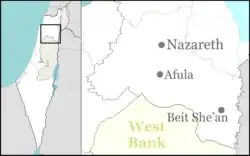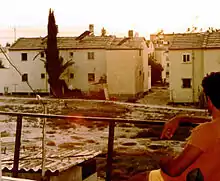1974 Beit She'an attack
The 1974 Beit She'an attack, which took place during November 19, 1974, was a raid by a squad of three Palestinian militants, belonging to the Democratic Front for the Liberation of Palestine militant organization, on the Israeli city of Beit She'an.
| 1974 Beit She'an attack | |
|---|---|

The attack site | |
| Location | Beit She'an, Israel |
| Date | November 19, 1974 |
Attack type | Shooting, kidnapping |
| Weapons | AK-47 rifles, grenades, bombs and axes |
| Deaths | 4 Israeli civilians (+ 3 Palestinian attackers) |
| Injured | 20+ Israeli civilians |
| Perpetrators | Democratic Front for the Liberation of Palestine |
Four civilians were killed during the event and more than 20 civilians were injured.[1] The three attackers were killed by responding Israeli special forces. The incident became notorious after an enraged mob of Israeli civilians that the army and police failed to control burned the bodies of the militants.
The attack

On Tuesday, November 19, 1974, three Palestinian militants who infiltrated into Israel from Jordan disguised as laborers. The militant squad arrived at the town of Beit She'an in northern Israel and entered a 4-storey building in the Eliyahu neighborhood. The militants were equipped with AK-47 rifles, grenades, bombs, axes, as well as a loudspeaker and leaflets for the negotiations with the Israeli security forces.
Initially the militants fired through the apartment doors hitting Mazal Edry, who died later of her wounds in the stairwell. Then the squad broke into the apartment of the Bibas family who lived on the third floor. After murdering the mother of the family, they threw grenades from the windows, demanding the release of their comrades from Israeli prisons. During the event, the three children of the Bibas family, jumped out of the apartment from their third-floor window, suffering only light injuries. Jean Pierre Alimi, a resident of the neighborhood, was killed by the militants while he helped evacuate the wounded.
The people evacuated from the building alerted the Border Police who soon afterwards surrounded the building. An attempt was made to negotiate with the militants. The IDF sent a team from the elite Sayeret Matkal special forces unit, which included Muki Betser, Shay Avital, and Nehemiah Tamari. After negotiations failed, the Sayeret Matkal team broke into the building, and killed the three militants in an exchange of fire. During the exchange of fire, the father of the Bibas family was killed.
During the entire event some 20 Israeli civilians were injured, many of them children whom jumped out of their apartment windows in order to save their lives.
Fatalities
- Mazal Edry, 42, of Beit She'an[2]
- Jean Pierre Alimi, 37, of Beit She'an[3]
- Zohar Bibas, 53, of Beit She'an[4]
- Yehuda Bibas, 53, of Beit She'an[5]
The perpetrators
After the attack the Palestinian militant organization Democratic Front for the Liberation of Palestine claimed responsibility for the attack. Prior to this attack the organization performed several major attacks against Israeli targets, including: the Avivim school bus massacre carried out on May 22, 1970, and the Ma'alot massacre carried out on May 15, 1974.
Aftermath
After the militants were killed, a large crowd of locals gathered around the building. The police and IDF forces at the site failed to stop them as the angry residents entered the apartment and threw the bodies of the militants out the window. The angry mob poured petrol on the bodies and torched them. The body of one of the victims was accidentally lit as well. The maltreatment of the militants bodies was later on condemned by the Minister Shimon Peres and Rabbi Shlomo Goren who participated in the funerals of the victims.
Years after the event an avenue in Beit She'an was named "Shderat HaArba'ah" ("The Avenue of the Four") in memory of the victims of the attack.[6]
References
- "Mazal Edri" (in Hebrew). Archived from the original on May 8, 2012. Retrieved October 8, 2011.
- "Jan Alimi" (in Hebrew). Archived from the original on May 8, 2012. Retrieved October 8, 2011.
- "Zohar Bibas" (in Hebrew). Archived from the original on May 8, 2012. Retrieved October 8, 2011.
- "Yehuda Bibas" (in Hebrew). Archived from the original on May 8, 2012. Retrieved October 8, 2011.
- "Archived copy". Archived from the original on December 22, 2010. Retrieved August 24, 2019.CS1 maint: archived copy as title (link)
External links
- Terrorists Had Killed 4 Residents of a Village Near Jordan Border – published on The New York Times on November 20, 1974
- Arab Terrorists Raid Israel, Grab Hostages – published on the Pittsburgh Post-Gazette on November 19, 1974
- Arab Terrorists Raid Israeli Town – published on the St. Petersburg Times on November 20, 1974
- Arab Terrorists Kill 4 Israelis; Die In Shootout – published on the News And Courier on November 20, 1974
- Israel Condemns Guerrillas And Vows To Eliminate Them – published on the Lodi News-Sentinel on November 20, 1974